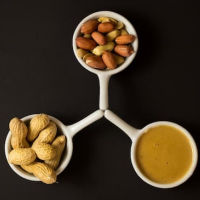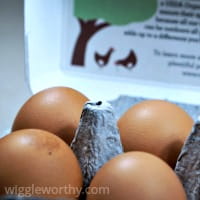Can Dogs Eat Nuts?
Yes, dogs can eat some types of nuts (in moderation) but it's very important to avoid the ones which can cause digestive problems or toxicity.
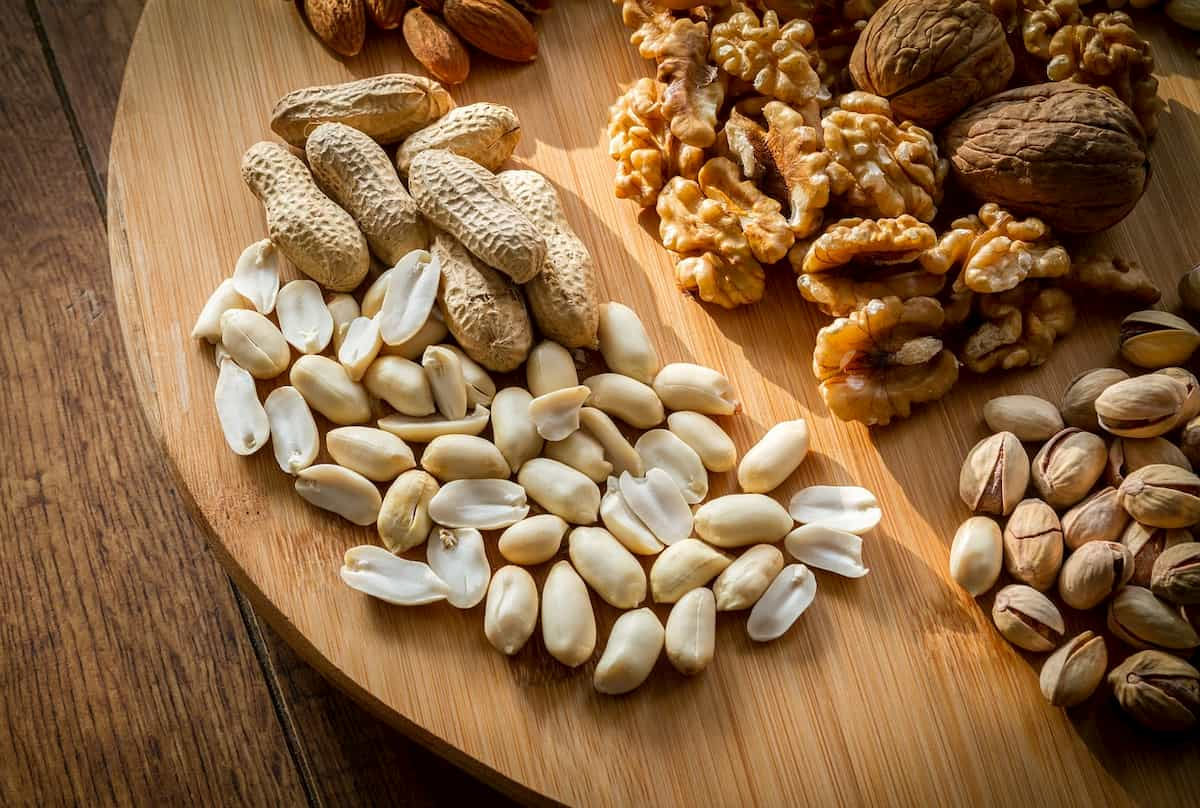
Although nuts are nutrient super-heroes, dogs definitely don't NEED them as part of their diet. Whole nuts in general are best avoided as even non-toxic varieties can cause tummy upset or sometimes intestinal blockages.
Dogs who have sensitive digestive systems or pancreatic issues should never be given nuts.
Nuts that are toxic or poisonous to dogs include:
Some nuts are not actually toxic, but can cause digestive upset such as diarrhea or vomiting, or are potentially unsafe for other reasons. These include:
Nuts that are safe for dogs to eat:
* Almond butter is also okay to give in moderation, but I wouldn't recommend giving the nuts themselves because they can cause digestive issues or other problems.
Can dogs eat nut butters?
Nut butters are a popular ingredient in many dog treat recipes and of course we all know how much dogs LOVE peanut butter in general, and how versatile it is.
There are a few nut butters which are safe for dogs, including almond butter and most peanut butters (learn how to be sure your peanut butter is dog-safe, many brands are NOT).
Check out THIS PAGE to find out which nut butters are safe for dogs and which aren't.
Which Nuts Are Bad For Dogs?
Let's start off with the most important information, and that's a list of the nuts which can cause problems (sometimes severe) for dogs:
Macadamia Nuts
Macadamia nuts are the #1 nut to avoid feeding to your dog.
Although veterinarians and researchers aren't quite sure WHY macadamia nuts cause dogs to become ill, there's no doubt that they do. Ingesting just a fraction of an ounce (approx. 1/10th ox) per 2lbs of body weight could cause symptoms of toxicity.
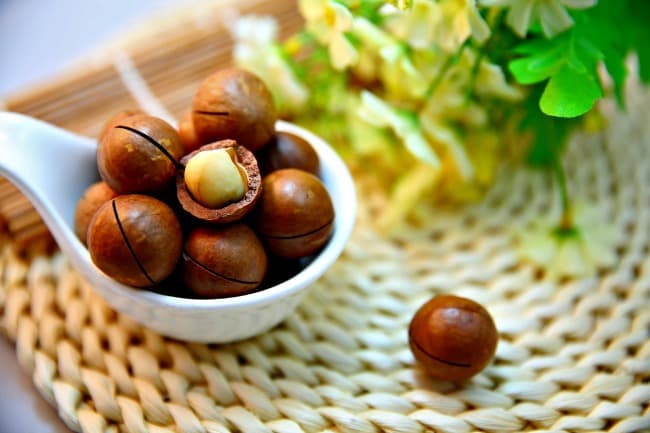
For example: 1 oz of macadamia nuts could cause a 20lb dog to become ill. At this dosage symptoms would most likely be mild.
Symptoms of macadamia nut toxicity in dogs can include:
- Vomiting
- Diarrhea
- Stomach pain
- Shaking
- Lethargy
- Weakness in the legs (usually rear legs)
- Stumbling and/or loss of coordination
- Fever (anything over 103F)
- Rapid breathing and heartbeat
- Pale gums and lips
In mild cases (when only a little of the nuts have been ingested) digestive symptoms may be the only thing you'll notice.
If your dog has eaten more than the minimum dose then the other signs of illness are likely to show up.
Although eating macadamia nuts is generally not fatal, in rare cases it can be so it's important to get your dog evaluated by a veterinarian right away if he shows any signs of illness or if you know he's eaten more than the minimum dosage. Some dogs need extra fluids, anti-nausea medications, fever reducers, pain killers, oxygen or other treatment.
In most mild cases symptoms resolve themselves within 12 to 48 hours. But if your dog has vomiting or diarrhea he may need extra fluids to prevent dehydration. If he can't keep water down contact your vet asap. Moderate to severe cases need professional veterinary care.
Walnuts
Walnuts should generally be avoided because although some kinds may not cause a problem, others can contain mycotoxins.
The leaves, stems of walnut trees, and the shell (or hull) of the nuts themselves also contain a toxic compound called Juglone.
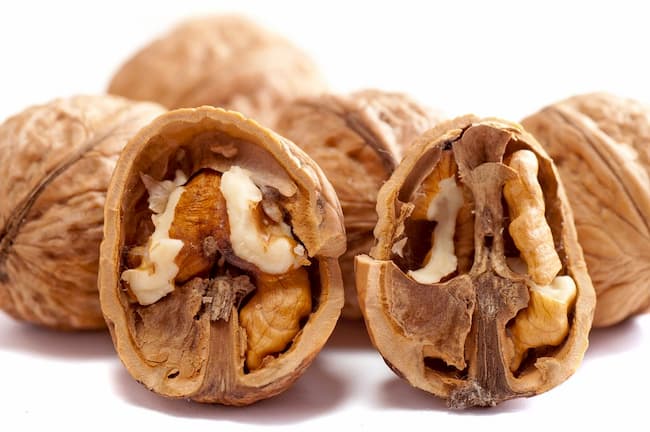
This toxin is found in fungus which may, or may not, be visible. Black walnuts and English walnuts should never be given to dogs as these are high-risk for harboring the mycotoxin called Penitrem A.
Symptoms of walnut-induced toxicity in dogs include:
- Muscle weakness
- Tremors or shaking
- Seizures
- Vomiting
- Diarrhea
- Elevated temperature (anything over 103F)
Because the toxin affects the neurological system the most common signs of poisoning are muscle weakness, tremors or seizures, all of which can cause serious, even life-threatening, complications.
If you think your dog may have ingested walnuts, especially Black or English varieties, always get in touch with your veterinarian right away as the sooner he gets treatment the safer he'll be. Click on the following link to get a closer look at the effects and treatment option for penitrem A toxicity in dogs.
Although other walnuts such as Japanese walnuts aren't generally considered dangerous, if they become moldy that mold can contain mycotoxins too, causing similar symptoms as listed above.
Pecans
Pecan shells and the leaves, stems and branches contain a toxin called Juglone, which is mildly poisonous for dogs, and could cause digestive upset if your dog chews on them.
However when moldy the pecan nuts themselves contain aflatoxins which cause nasty symptoms and could be fatal to your dog eats them.
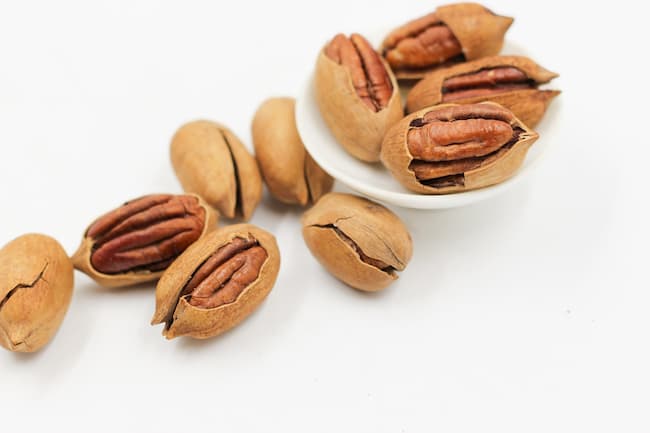
Symptoms of aflatoxin poisoning in dogs include:
- Vomiting
- Lethargy
- Loss of appetite
- Yellowing of mucus membranes (jaundice)
- Dark colored urine
Symptoms of this type of poisoning are vague at first, but left untreated can cause liver failure. This can happen quickly, so if your dog ingests moldy pecans it's very important to get him a full veterinary examination right away!
Learn more about aflatoxin symptoms and treatment in dogs HERE.
Hickory Nuts
Hickory nut trees and shells (hulls) contain the toxin Juglone which is mildly toxic and can cause digestive problems for dogs. It's unlikely to be fatal unless your dog eats a lot of bark, sticks, shells and so on.
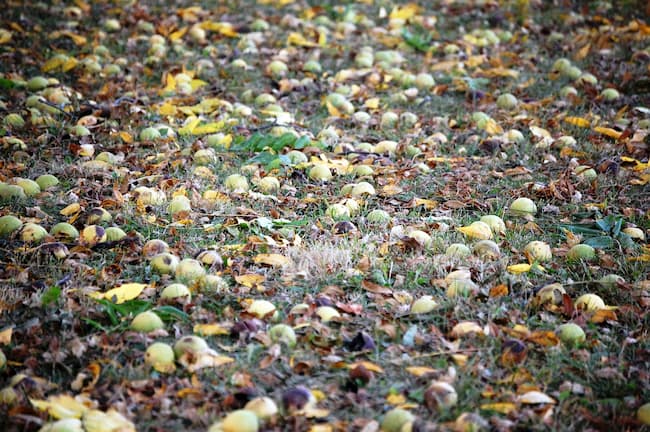
As with walnuts and pecans, hickory nuts can contain mycotoxins if they become moldy. This can cause a variety of symptoms if your dog ingests them, ranging from digestive upset to seizures, and can be fatal.
Symptoms of hickory nut toxicity in dogs include:
- Diarrhea
- Vomiting
- Abdominal pain
- Dehydration
- Shaking or tremors
- Weakness in limbs
- Elevated body temperature (anything over 103F)
- Elevated heart rate
- Unusual eye movements
- Seizures
- Pancreatitis*
Pancreatitis is inflammation of the pancreas, and is can be caused by several things, including a high fat diet. Pancreatitis in dogs is a serious, potentially fatal, condition and a dog with pancreatitis needs urgent veterinary care.
Symptoms of pancreatitis in dogs can include vomiting, diarrhea, abdominal pain, loss of appetite, dehydration, weakness or lethargy, fever.
Check out this page on the AKC website to learn more Pancreatitis in Dogs.
Horse Chestnuts
Horse chestnut trees (sometimes called Buckeye trees in the US) grow in many parts of the world, including the US, and their nuts (known as 'Conkers' in the UK) often litter the ground during the Fall.
The bark, sticks, leaves, hull and nuts of the horse chestnut tree contain a neurotoxin called Aesculin which is extremely toxic to dogs. It can even cause sudden death.
The size/shape of chestnuts also make them a significant choking hazard, or if swallowed an internal obstruction.
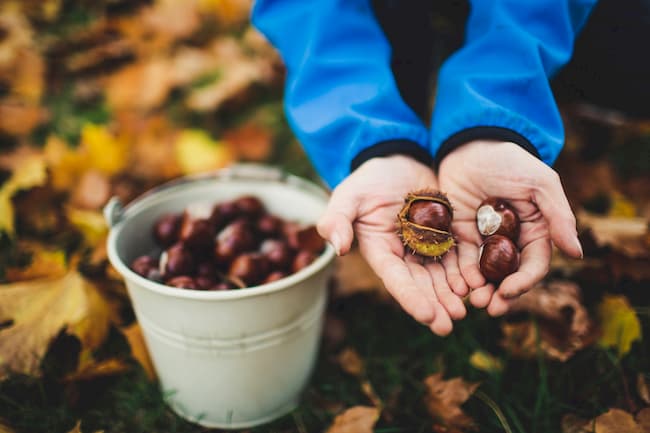
Symptoms of horse chestnut toxicity in dogs include:
- Vomiting
- Diarrhea
- Excessive drooling
- Lethargy
- Loss of appetite
- Increased thirst
- Hyperactive behavior
- Muscle twitching
- Tremors or shaking
- Loss of balance and/or coordination
- Seizures
- Paralysis
- Sudden death
Although aesculin is extremely dangerous to dogs, it isn't easily absorbed by the body and all parts of the chestnut tree have an unpleasant taste (not to mention the hulls of the nuts are covered in spikes) so it's unusual for a dog to ingest high quantities of it.
However, because it is so toxic, if you suspect your dog has eaten ANY part of the chestnut tree, or chestnuts themselves, it's very important to get him immediate veterinary evaluation and care.
ASPCA Poison Control Hotline
If you're worried that your dog has ingested nuts (or any other toxic item) you can call the ASPCA Poison Control Center 24/7 every day of the year. Keep this number where you'll always know where to find it!
ASPCA Poison Control Center: 1-888-426-4435
*There may be a consultation fee, but your dog's life is worth it.
Which Nuts MAY Be Unsafe for Dogs?
Almonds
While almonds themselves aren't actually toxic to dogs, they are difficult for them to digest and can cause vomiting, diarrhea, stomach pain or intestinal blockage.
These nuts often come flavored or heavily salted, these additions alone are definitely NOT good for your dog.
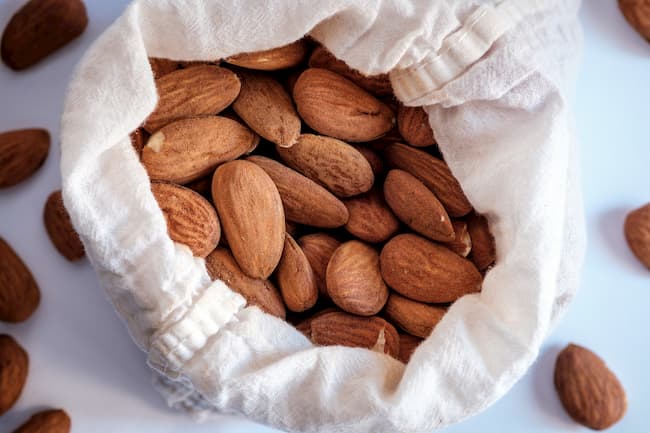
Almonds which have gone moldy can contain aflatoxins which ARE toxic and can cause a variety of symptoms, including liver damage, and can be fatal.
Symptoms of almond toxicity in dogs include:
- Vomiting
- Diarrhea
- Abdominal pain
- Lethargy
- Loss of appetite
- Yellowing of mucus membranes (jaundice)
- Dark colored urine
Symptoms of aflatoxin poisoning can be mild at first, but do irreversible damage at the same time. If you think your dog may have eaten almonds it's vital to get him examined by a veterinarian right away.
Note: One or two almonds (that are fresh and definitely NOT moldy) are unlikely to cause serious problems but definitely consult your vet for advice. If there are any signs of digestive upset get him a veterinary examination immediately.
Also, almond butter can be used in dog treat recipes, but again do this sparingly.
Hazelnuts
Hazelnuts are not toxic to dogs.
But their size and shape means that they can be a choking hazard, especially for small dogs.
If swallowed whole (which medium to large size dogs may well do) it's possible that they can cause an obstruction in the intestines.
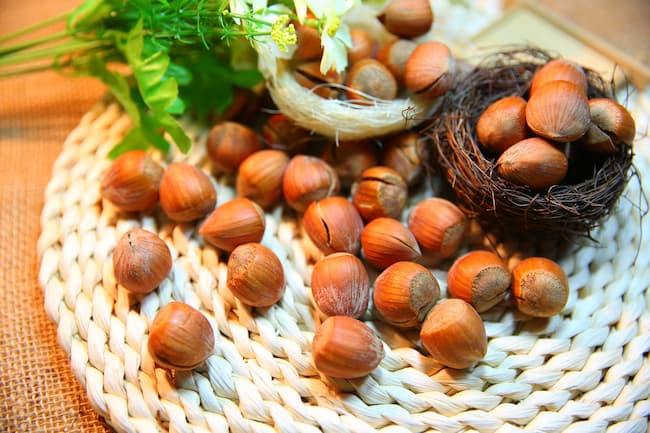
As with many other nuts, hazelnuts are often flavored, or chocolate covered and anything other than plain, roasted nuts are not suitable for dogs. Chocolate alone is deadly.
Hazelnuts are fairly high in fat, and although they are actually healthy fats, it still means that they're calorie dense and not easy to digest. This can lead to digestive upset and even, in severe cases, pancreatitis.
So although your dog will be fine if he eats a couple, I wouldn't recommend giving them to him regularly. Or at all if he's a small breed.
Hazelnut butter doesn't have the choking risk associated with it and so can be used safely in small amounts (remember, high fat!) in your dog treat recipes.
Pistachios
Pistachios don't contain mycotoxins or aflotoxins like some of the other varieties of nuts discussed above.
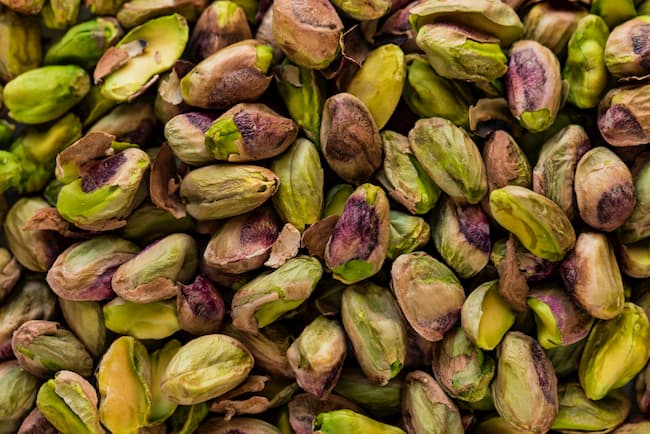
However they are very high in fat and can cause gastrointestinal problems such as vomiting or diarrhea, and have the potential to cause pancreatitis in dogs.
Pancreatitis is a very dangerous condition and needs immediate veterinary attention.
Which Nuts Are Safe for Dogs?
There are a couple of varieties of nuts that are generally considered safe for dogs to eat. However, remember that nuts are high in fat and not easy to digest, so never give your dog more than one or two nuts at a time.
If your dog has a sensitive tummy, digestive or pancreatic issues please don't ever give him nuts of any kind as they could cause serious problems.
Peanuts
Plain, unsalted peanuts are considered to be safe for dogs and peanuts (and peanut butter) the number one choice if you want to give your dog a nutty treat.
Choose raw, or dry roast peanuts as those are the most suitable for our four legged friends.
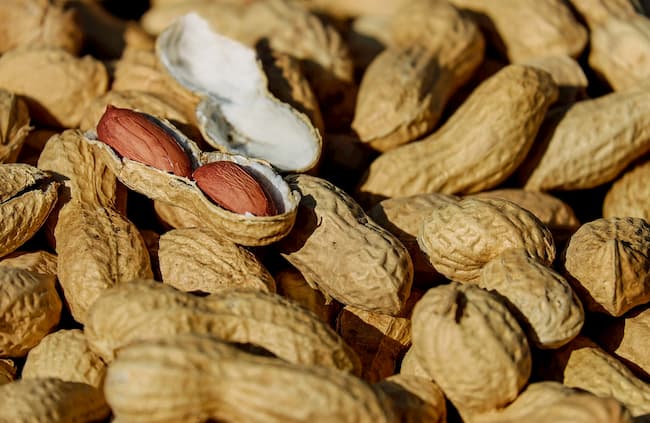
As with all nuts they are high in fat and so should be given sparingly... and never to dogs who have sensitive digestive systems or pancreatic problems.
Peanut shells are very fibrous and can cause both a choking hazard and digestive issues if ingested so be sure to keep those away from your dog.
Peanut allergies in dogs are fairly rare, but they can happen. If your dog starts coughing, sneezing, having trouble breathing or appears to develop hives or swelling (particularly around his face) after eating peanuts then it's important to contact your veterinarian right away. If he's having trouble breathing get him to your veterinarian or an emergency pet hospital right away.
Xylitol in Peanut Butter is Toxic to Dogs!
Peanut butter is nutritious and versatile and can be used in a huge number of dog treat recipes as well as to fill Kongs and similar dog toys or to help administer medications or keep your dog occupied while being groomed or bathed.
However not all peanut butters are safe for your dog! Some contain Xylitol which is a sugar substitute which is extremely dangerous to dogs. Ingesting even a small amount can be deadly so please, always read the label on the peanut butter jar before giving it to your dog!
Cashews
Cashews are lower in fat than most other nuts, but they still contain enough fat to cause problem for dogs with sensitive digestive systems or pancreatic problems.
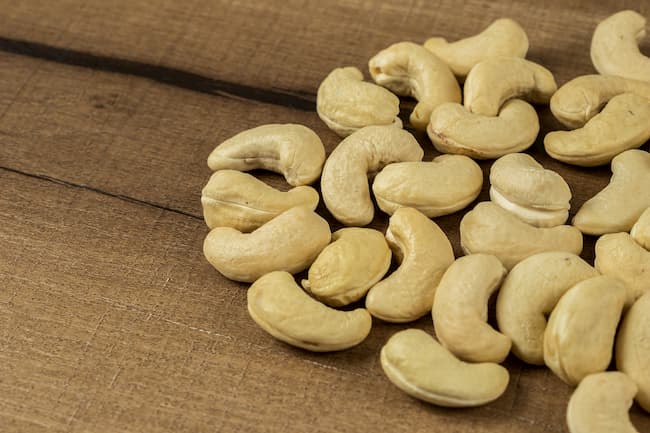
In addition, eating too many cashews may increase your dog's chances of developing bladder stones because they have a high concentration of phosphorous so absolutely avoid these if your dog has a history of bladder problems.
As with other nuts, choose UNsalted and unflavored varieties for your dog.
Cashew butter can be safely used when making homemade dog treats.
You Might Also Like These pages...
- Home
- Dog Treat Ingredients
- Can Dogs Eat Nuts?

